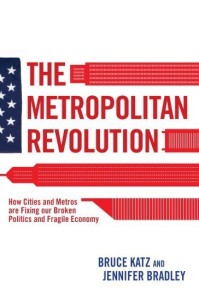"We believed then as we do now, that the sharing economy can democratize access to goods, services, and capital — in fact all the essentials that make for vibrant markets, commons, and neighborhoods. It’s an epoch shaping opportunity for sustainable urban development that can complement the legacy economy. Resource sharing, peer production, and the free market can empower people to self-provision locally much of what they need to thrive. Yet we’ve learned that current U.S. policies often block resource sharing and peer production. - From the … [Read more...]
The Mayor As Entrepreneur-in-Chief
[ Ramsin Canon is one of the most keen left political observers I know in Chicago. Among other things he's been the politics editor at Gapers Blocks, a union organizer, and is now a law student I believe. Needless to say, he's no fan of "neoliberalism", even when practiced by those on the left. Here he provides his frame and critique of the current reigning governance model in our various levels of government re:cities. I may revisit this topic with my own thoughts in the future, but I'd like to make a couple of observations here. 1) Canon sees … [Read more...]
The Growing Public Safety Inequality Gap in Chicago
[ Daniel Hertz writes over at his City Notes blog. He was gracious enough to give me to permission to repost the results of his research into changes in crime patterns in Chicago over time - Aaron. ] Here are two maps: HOMICIDE RATE BY POLICE DISTRICT 1990-1993 2008-2011 Like the captions say, the one on the left shows homicide rates by police district in the early 90s, when crime was at its peak in Chicago, and the one on the right shows the same thing, but about two decades later.* The areas in dark green are the … [Read more...]
What Is a Global City?
This post originally ran on August 19, 2012. We hear a lot of talk these days about so-called "global cities." But what is a global city? Saskia Sassen literally wrote the book on global cities back in 2001 (though her global cities work dates back well over a decade prior to that book). She gave a definition that has long struck with me. In short form, in the age of globalization, the activities of production are scattered on a global basis. These complex, globalized production networks require new forms of financial and producer … [Read more...]
Cities Need More Fiscal Supervision By State Governments
[ When it comes to local affairs, I'm typically in favor of more devolution of powers to local governments, especially larger ones. On the other hand, Detroit's bankruptcy shows that local government can easily make a hash out of things. Stephen Eide makes the case for why states should exercise more not less fiscal supervision over cities - Aaron. ] Four years after the end of the recession, cities’ fiscal outlook remains unpromising (discussions here and here, esp. 53-6). Spending on healthcare and pensions continues to rise faster than … [Read more...]
What Detroit’s Bankruptcy Teaches America
As has long been expected, the city of Detroit has officially filed for bankruptcy. While many will point to the sui generis nature of the city as a one-industry town with extreme racial polarization and other unique problems, Detroit’s bankruptcy in fact offers several lessons for other states and municipalities across America. The Day of Reckoning Can Take Much Longer Than We Think to Come What’s most surprising about Detroit’s bankruptcy is not that it happened, but how long it took to get there. In authorizing the bankruptcy filing … [Read more...]
The Metropolitan Revolution
The Metropolitan Revolution by Bruce Katz and Jennifer Bradley Brookings Institution Press, June 2013 By far the most important thing that the Brookings Institution Metropolitan Policy Program has done is educate and advocate for the reality of the metro-centricity of the United States. This might seem obvious from their name, but from the behavior of all too many, this new metro reality is apparently not obvious to most. Lost in the statistics of world urbanization is the fact that the United States is already almost entirely … [Read more...]
Cities Need a “Deaccessioning Policy” for Public Assets
One of the major controversies following the appointment of Kevyn Orr as emergency financial manager for the city of Detroit has been the exploration of whether or not the art at the city-owned Detroit Institute of the Arts can or should be sold to satisfy creditors in the event of a bankruptcy filing. This obviously sent shock waves of indignation through the community. Following on from that, the Detroit Free Press took a look at what other assets could be on the auction block. In addition to extremely valuable masterpieces by the likes of … [Read more...]
Chicago’s Daley Deals
Politics + Projects = Planning......And The Deal Beyond Daley Chicago has trouble beating its rap portrayed in the popular media these days. So do the Daleys. Three books give a balanced description of what The Daley Years got done, focusing on the son’s service as Mayor from 1989 to 2011. By reviewing these books in context, this essay suggests that two key tasks in completing Chicago’s transformation -- revitalized poorer neighborhoods and improved transit -- requires sacrifice from taxpayers and a new deal. Richard M. Daley was raised … [Read more...]
The Problem of Innovation
This post originally ran on February 6, 2011. And his disciples asked him, saying, Why then say the scribes that Elias must first come? And Jesus answered and said unto them, Elias truly shall first come, and restore all things. But I say unto you, that Elias is come already, and they knew him not...Then the disciples understood that he spake unto them of John the Baptist. - Matthew 17:10-13Behold, there went out a sower to sow: And it came to pass that, as he sowed, some fell by the way side, and the fowls of the air came and devoured it … [Read more...]

